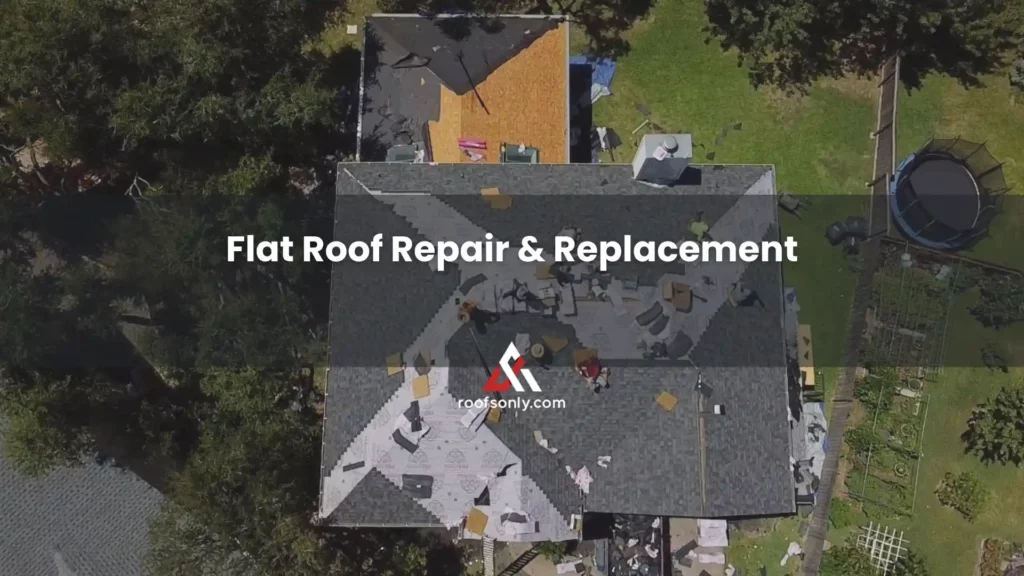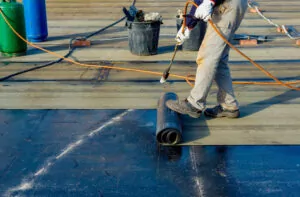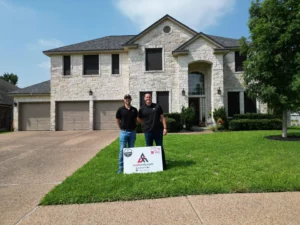
RoofsOnly.com is the leader in the repair and replacement of flat roofs and other flat-roof systems, serving residential and commercial property owners in Austin, Buda, Manor, Hutto, Round Rock, Leander, Dripping Springs, Westlake, and Central Texas.
Our professional roofing experts have extensive experience handling flat roof repair, installations, inspections, maintenance, and replacement. For the highest-quality materials and workmanship to the attentive customer service you deserve, call or contact us online today.
When Are Flat Roof Systems Used?
Since the earliest construction projects, builders have utilized flat roof systems. They are often valued for their easy access and match the local landscape. Residential structures can also use flat roofs primarily found on commercial buildings. Some property owners might find that flat roof systems are particularly vulnerable to extreme heat and cold, and they will require expert installation and routine maintenance to keep leaks from developing.
What Are Some Advantages of a Flat Roof?
Flat roofs are interesting from an aesthetic point-of-view and are more energy efficient than the traditional sloped roof. They are easier to maintain and quite versatile, making them popular for modern homebuilders and commercial property owners.
Some of the most notable benefits are:
Versatility
A flat roof can expand the structure’s usable living or workspace. Some homeowners might choose to install a rooftop garden or a deck. These additions are usable and provide additional protection from the elements.
Cheaper construction and repair costs
Flat roofs do not take up as much space as sloped roofs and require less material. Less material makes construction and installation cheaper and means that any needed repairs will be less costly.
Energy efficient
Flat roofs help you keep your utility costs down, especially in the hot Texas heat. Sloped roofs often retain warm air inside or let cooled air escape. A flat roof will be more energy efficient for your structure, with less overhead space for air to become trapped.
The Cost of Flat Roof Repairs vs. Replacement
You might need to repair or replace your damaged flat roof. But how do you know which option is right for you? Repairing your not-so-old roof with specific damages might be more cost-effective than replacing it.
Constant repairs can make roof maintenance costly and unfeasible. Replacing your roof could be more economical than piecemeal repairs when there is extensive damage.
At RoofsOnly.com in Texas, we know roof replacement is an investment. However, affordable flat roofs, when maintained, can last decades. If you’re constantly repairing a failing flat roof, we might suggest a new roof installation. Use our cost calculator for a rough roof replacement estimate. Contact us for an inspection and quote.
Signs That a Flat Roof Needs to be Repaired or Replaced
Identifying whether your flat roof needs repair or replacement is essential; here are the key signs to watch for in maintaining its integrity.
Signs That a Flat Roof Needs Repairing:
Flat roofs, known for their versatility and energy efficiency, require regular maintenance to stay effective. In Texas’s varied climate, recognizing early signs of wear is key to timely repairs. These signs include:
- Minor rips or cracks in the roofing material.
- Small areas of water pooling.
- Initial signs of adhesion failure, such as minor bubbling.
- Occasional loose fasteners.
Promptly addressing these issues with RoofsOnly.com’s expert repair services can extend your flat roof’s lifespan and prevent larger problems.
Signs That a Flat Roof Needs Replacing:
- At times, repairs may not suffice, and a full roof replacement is necessary. Key indicators for this include:
- Persistent or extensive water leaks causing mold.
- Widespread water pooling on the roof.
- Major rips or cracks in the roofing material.
- Severe bubbling or adhesion failure.
- Sagging in the ceiling.
- Numerous loose fasteners.
Early detection of these signs can avert more serious damage to your property. A timely replacement by RoofsOnly.com ensures the preservation of your property’s integrity and avoids future complications.
Flat Roof Types and Materials
Flat roofs, a common feature in both residential and commercial architecture, offer various material choices, each with its unique benefits. Understanding these options is key to selecting the right flat roof for your property.
Single-Layer Membrane Roof
This modern roofing technology, often used in commercial buildings, includes materials like EPDM (ethylene propylene diene monomer), a flexible and temperature-resistant synthetic rubber. Other varieties in this category are chlorinated polyethylene, chlorosulfonated polyethylene sheets, neoprene (polychloroprene), polymer-modified bitumens, and PVC (polyvinyl chloride). These single-ply roofs are known for their adaptability to extreme temperature changes.
Modified Bitumen Roof
A 1960s innovation, modified bitumen roofs replaced traditional build-up roofing. They feature polymer-reinforced cap sheets, enhancing flexibility and elasticity in cooler temperatures. Different application methods, such as self-adhesive, cold, hot, and torch applications, are available for this type.
Built-Up Roof (BUR)
One of the oldest methods, BUR uses multiple layers of roofing felt embedded in bitumen, topped with crushed stone granules for weather and UV protection. This method creates a robust, multi-layered membrane.
Thermoplastic Polyolefin (TPO) Roofs
TPO is a flame-resistant material that absorbs UV rays, with a lifespan of 15 to 20 years. Its recyclability adds an environmental benefit.
Polyvinyl Chloride (PVC) Roofs
Similar to TPO in terms of temperature tolerance, PVC roofs are sturdier and can last up to 20 years. They are a cost-effective option for enduring Texas’s summers.
Rubber Membrane Roof (EPDM)
Known for its low cost and longevity of 25 to 30 years, EPDM roofs are typically anchored with adhesives, fasteners, or rocks. This material is particularly noted for its ease of installation.
Each of these materials caters to specific requirements, balancing factors like cost, durability, and maintenance needs. At RoofsOnly.com, we help you navigate these options to find the best fit for your flat roofing needs.
Contact our Flat Roof Repair and Replacement Professionals in Texas

Ensure your flat roof system withstands Texas’s intense weather and the test of time by properly installing it and conducting routine inspections and maintenance. Not every roofing company has the right skills and materials to do the job.
At RoofsOnly.com, our Texas roofing contractors have experience handling all flat roof systems. Our team prides itself on our workmanship and commitment to customer satisfaction.
Call us at (512) 746-7090 or contact us online today for an inspection and estimate.
Frequently Asked Questions
What is a flat roof?
A flat roof is what it sounds like; it’s flat (almost). A flat roof has a slope of fewer than 10 degrees across the entire surface area. Flat roofs appear flat, but they have a little pitch to allow water to drain. Flat roof systems have a higher risk of allowing water to accumulate, so drainage is a top issue. To learn more about flat roof solutions, contact a local RoofsOnly.com specialist.
What are the benefits of installing a flat roof system?
There are numerous advantages to installing a flat roof system. One of the most advantageous characteristics is versatility. Both homeowners and business owners can use this roof structure as a garden or an additional eating location. Flat roof systems have a smaller surface area than other roofing systems, which results in lower construction and labor costs. The less surface area you have, the fewer resources you’ll need and the less labor you’ll have to do! Another advantage is that they save energy. Compared to sloped roofing systems, flat roofs are better at releasing heat. Find out if a flat roofing system is perfect for you by contacting a local RoofsOnly.com specialist.
How long do flat roof systems last?
A flat roofing system can easily last 20 years or more if properly maintained. Standing water is a common issue with flat roofing systems. To prevent water from building up and causing additional problems, make sure your flat roof has an easy way to drain it. If you have any questions regarding your flat roof or want to learn more about flat roof installation, contact RoofsOnly.com now!

